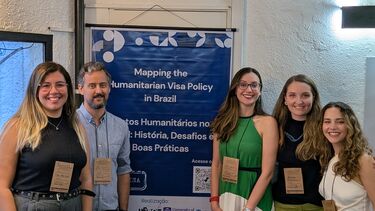On March 24–25, the research team behind the project Mapping Humanitarian Visas in Brazil hosted the National Forum on Humanitarian Visas in Brazil: History, Challenges, and Best Practices in SĂŁo Paulo, Brazil. This research initiative is a collaborative effort led by Dr Patricia Nabuco Martuscelli (University of 91Ö±˛Ą), Dr Svetlana Ruseishvili (Federal University of SĂŁo Carlos, Brazil), and Dr Natália Cintra (University of Southampton), with funding from of the Economic and Social Research Council of the United Kingdom (ESRC/UKRI).
The forum’s primary objective was to establish and consolidate a diverse and interdisciplinary network of actors to advance knowledge about humanitarian visas (HVs) in Brazil. The event successfully brought together key stakeholders, including representatives from the Brazilian government—such as the Federal Police, the Ministry of Justice, and the Ministry of Foreign Affairs—alongside international organisations like the International Organization for Migration (IOM) and the United Nations High Commissioner for Refugees (UNHCR). Civil society organisations engaged in migration issues, academics, journalists, and migrant activists from different communities also actively participated. A distinguishing feature of the forum was its commitment to providing equal speaking opportunities for representatives of migrant communities, including both those already benefiting from humanitarian visas and those still seeking access to such protections.
The Context of Humanitarian Visas in Brazil
Humanitarian visas are increasingly recognised as a viable solution to unsafe migration routes and as an alternative to the growing distrust in asylum systems in several countries. While the Global Compact for Refugees (2018) identifies HVs as a complementary protection pathway, further research is needed to define their scope, assess their effectiveness, and understand their role within policy cycles. Brazil offers a valuable case study, having issued HVs for over 12 years within a complex policy landscape where civil society, government bodies, and UN agencies interact in decision-making spaces.
Brazil’s asylum legislation incorporates core principles of international and regional refugee law, with humanitarian admission pathways playing a crucial role. Since 2012, the country has granted HVs to four specific national groups: Haitians (2012), Syrians and others affected by the Syrian conflict (2013), Afghans (2021), and Ukrainians (2022). The Migration Law (Law 13.445/2017) formally integrated humanitarian visas into Brazilian migration policy, and in 2019, an inter-ministerial ordinance from the Ministry of Justice and the Ministry of Foreign Affairs established the Brazilian government as the sole authority in determining which nationalities are eligible for such visas and under which conditions.
The Contested Nature of Humanitarian Visas
Discussions at the National Forum in Brazil highlighted the contested nature of humanitarian visa policies, particularly regarding their role in ensuring protection and rights for forcibly displaced individuals. Key issues raised by participants included the relationship between HVs and the 1951 Geneva Convention, criteria for extending humanitarian visas to additional nationalities, and the broader challenges of implementing humanitarian admission policies as public policy measures.
Migrant communities emphasised the importance of HVs as a means of accessing territory and facilitating asylum requests. However, they also pointed out the limitations of HVs as an ad hoc policy, expressing concerns over the Brazilian state's inefficiency in ensuring adequate reception and integration for those already admitted under these visas.
In the Latin American context, where Brazil has positioned itself as a leading actor in receiving forcibly displaced populations, discussions on complementary protection mechanisms raise fundamental questions about the future of human rights and the dignity of displaced persons. These debates become particularly relevant amid a global landscape increasingly marked by hostility and nationalist policies.
The National Forum on Humanitarian Visas in Brazil served as a crucial space for dialogue, bringing together diverse perspectives on the past, present, and future of humanitarian visas. By fostering interdisciplinary collaboration and centring migrant voices, the event contributed to a deeper understanding of the challenges and possibilities for humanitarian admission policies in Brazil and beyond. As the debate on migration governance continues, it remains essential to critically assess and improve policies that affect the lives of those in need of international protection.
More information about the Mapping the Humanitarian Visa Policy in Brazil is available
This blog post was co-written by Dr Patricia Nabuco Martuscelli (University of 91Ö±˛Ą), Dr Svetlana Ruseishvili (Federal University of SĂŁo Carlos, Brazil), and Dr Natália Cintra (University of Southampton)

